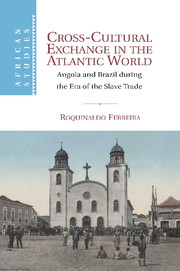Crossref Citations
This Book has been
cited by the following publications. This list is generated based on data provided by Crossref.
Kananoja, Kalle
2013.
Pai Caetano Angola, Afro-Brazilian Magico-Religious Practices, and Cultural Resistance in Minas Gerais in the Late Eighteenth Century.
Journal of African Diaspora Archaeology and Heritage,
Vol. 2,
Issue. 1,
p.
18.
Lovejoy, Paul E.
2014.
PAWNSHIP, DEBT, AND ‘FREEDOM’ IN ATLANTIC AFRICA DURING THE ERA OF THE SLAVE TRADE: A REASSESSMENT.
The Journal of African History,
Vol. 55,
Issue. 1,
p.
55.
Lindsay, Lisa A.
2014.
EXTRAVERSION, CREOLIZATION, AND DEPENDENCY IN THE ATLANTIC SLAVE TRADE.
The Journal of African History,
Vol. 55,
Issue. 2,
p.
135.
Sweet, James H.
2014.
REIMAGINING THE AFRICAN-ATLANTIC ARCHIVE: METHOD, CONCEPT, EPISTEMOLOGY, ONTOLOGY.
The Journal of African History,
Vol. 55,
Issue. 2,
p.
147.
Bassi, Ernesto
2014.
Beyond Compartmentalized Atlantics: A Case for Embracing the Atlantic from Spanish American Shores.
History Compass,
Vol. 12,
Issue. 9,
p.
704.
Schwegler, Armin
2014.
Portuguese-Spanish Interfaces.
Vol. 1,
Issue. ,
p.
403.
Grafe, Regina
2014.
On the spatial nature of institutions and the institutional nature of personal networks in the Spanish Atlantic.
Culture & History Digital Journal,
Vol. 3,
Issue. 1,
p.
e006.
Candido, Mariana P.
2015.
Engendering West Central African History: The Role of Urban Women in Benguela in the Nineteenth Century.
History in Africa,
Vol. 42,
Issue. ,
p.
7.
Nascimento, Augusto
Rodrigues, Eugénia
and
Fernandes, Paulo Jorge
2015.
Municípios e Poderes Locais em África: heranças e metamorfoses em tempos de incerteza.
Cadernos de Estudos Africanos,
p.
7.
Spicksley, Judith
2015.
Contested enslavement: the Portuguese in Angola and the problem of debt, c. 1600–1800.
Itinerario,
Vol. 39,
Issue. 2,
p.
247.
Hassell, Stephanie
2015.
Inquisition Records from Goa as Sources for the Study of Slavery in the Eastern Domains of the Portuguese Empire.
History in Africa,
Vol. 42,
Issue. ,
p.
397.
2016.
An Aqueous Territory.
p.
297.
Barcia, Manuel
2016.
‘Fully Capable of Any Iniquity’: The Atlantic Human Trafficking Network of the Zangroniz Family.
The Americas,
Vol. 73,
Issue. 3,
p.
303.
Domingues da Silva, Daniel B.
2017.
The Atlantic Slave Trade from West Central Africa, 1780–1867.
Gershman, Boris
2017.
Witchcraft Beliefs as a Cultural Legacy of the Atlantic Slave Trade: Evidence from Two Continents.
SSRN Electronic Journal,
Lindsay, Lisa A.
2017.
Biography in African History.
History in Africa,
Vol. 44,
Issue. ,
p.
11.
Verhoef, Grietjie
2017.
The History of Business in Africa.
p.
7.
2018.
Fugitive Modernities.
p.
195.
2018.
Fugitive Modernities.
p.
187.
Moore, Jason W.
2018.
The Capitalocene Part II: accumulation by appropriation and the centrality of unpaid work/energy.
The Journal of Peasant Studies,
Vol. 45,
Issue. 2,
p.
237.





